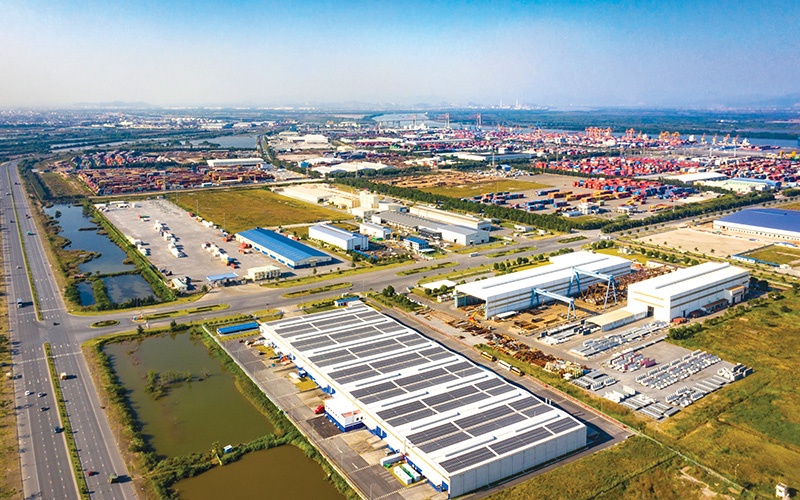Eco-park’s effective approach to sustainable growth
 |
| DEEP C Haiphong I Industrial Zone |
DEEP C is a cluster of industrial zones (IZs) developed and operated by Infra Asia Investment Hong Kong, majorly owned by Belgian company Ackermans & van Haaren in Haiphong and Quang Ninh in northern Vietnam.
Once known as a traditional industrial zone, DEEP C is now shifting to building eco-industrial parks with a green vision focusing on renewable energy, waste reduction, and industrial symbiosis practices.
“We are working towards the goal of supplying more than 50 per cent of total power consumption from renewable energy by the end of the decade,” said Bruno Jaspaert, general director of DEEP C Industrial Zones.
A 2.3MW wind turbine was installed in DEEP C Haiphong II Industrial Zone in November, known as the only wind energy project in the northern Vietnam today. With a height of 100m and a blade length of 120m, the wind turbine can generate an annual output of 3,101MWh.
The wind project is established on the back of the partnership between DEEP C and Unison, whereby DEEP C aims to supply its IZs with clean energy. Unison focuses on developing wind turbine technology optimised for low wind speed areas of under 6.5m per second in Southeast Asia.
Along with the wind energy project, two rooftop solar plants with a total peak capacity of 4.1MWp are under operation. One plant is installed on the rooftop owned by a tenant, representing a symbiotic activity for environmental benefits. All power generated from the wind turbine and solar plants is injected into DEEP C’s grid to be shared among businesses within the zones.
This sharing of energy and rooftop space and other common facilities such as liquids jetties was initially devised a long time ago and has gained momentum over the last few years.
Under the cooperation with the Vietnam Cleaner Production Centre and the United Nations Industrial Development Organization, DEEP C is conducting a survey to identify the symbiosis opportunities among the tenants and between the zones and tenants.
“The operating model of DEEP C features various manufacturing and service companies in different industries. This diversity gives our zones the advantage of evolving into a cluster of companies relying on each other to bring high economic, social, and environmental performances,” Jaspaert said.
To further step-up its sustainability efforts, the company started an organic farm with a non-chemical farming model which can easily be multiplied, ensuring resilience and sustainable livelihoods for local farmers.
For charity and welfare purposes, it provides free organic food baskets to low-income employees in DEEP C Industrial Zones every two weeks. Other employees are entitled to receive food baskets at the cost price.
“We want DEEP C Industrial Zones to become a magnet for businesses that care about social and environmental values. By becoming one through the development of eco-industrial parks, there is a real chance to boost investment from like-minded businesses into the area,” said Koen Soenens, general sales and marketing director of DEEP C Industrial Zones.
What the stars mean:
★ Poor ★ ★ Promising ★★★ Good ★★★★ Very good ★★★★★ Exceptional
Related Contents
Latest News
More News
- SK Innovation-led consortium wins $2.3 billion LNG project in Nghe An (February 25, 2026 | 07:56)
- THACO opens $70 million manufacturing complex in Danang (February 25, 2026 | 07:54)
- Phu Quoc International Airport expansion approved to meet rising demand (February 24, 2026 | 10:00)
- Bac Giang International Logistics Centre faces land clearance barrier (February 24, 2026 | 08:00)
- Bright prospects abound in European investment (February 19, 2026 | 20:27)
- Internal strengths attest to commitment to progress (February 19, 2026 | 20:13)
- Vietnam, New Zealand seek level-up in ties (February 19, 2026 | 18:06)
- Untapped potential in relations with Indonesia (February 19, 2026 | 17:56)
- German strengths match Vietnamese aspirations (February 19, 2026 | 17:40)
- Kim Long Motor and AOJ Suzhou enter strategic partnership (February 16, 2026 | 13:27)

 Tag:
Tag:




















 Mobile Version
Mobile Version